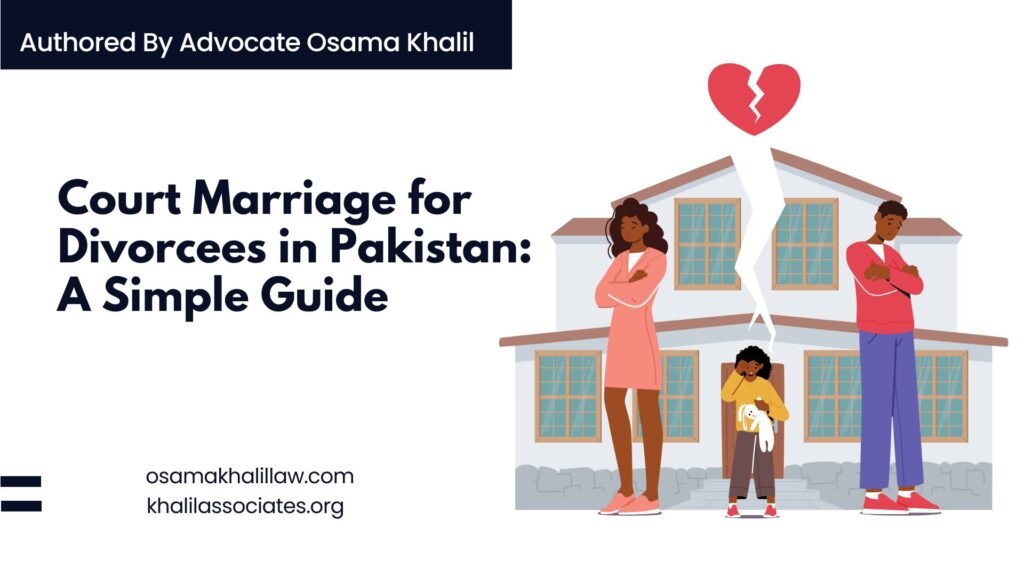
Many people in Pakistan wonder about court marriage for divorcees because they want a simple and legal way to remarry. The process is straightforward, but some people do not know the exact steps. This guide will explain everything in the simplest way possible.
First, you should understand that Nikah for divorced persons is completely legal in Pakistan. The law allows anyone who is divorced to marry again through a court process. Whether you are a man or a woman, you have the right to legal marriage after divorce without unnecessary delays.
Why Choose Court Marriage After Divorce?
Some people prefer court marriage for divorcees because it is quick and transparent. Unlike traditional weddings, a court wedding does not involve lengthy ceremonies or excessive expenses. Moreover, the process ensures that the marriage is legally registered, which helps in avoiding future disputes.
Another reason is privacy. Many divorcees want to keep their remarriage in Pakistan low-key. A court marriage allows them to complete the legal formalities without social pressure.
Legal Requirements for Court Marriage for Divorcees
Before proceeding with court marriage for divorcees, you must meet certain legal conditions. The requirements are simple, but you must follow them carefully.
First, both partners must be Pakistani citizens or have valid residency status. Second, they must be of legal age (18 years or older). Third, the woman must complete her iddat period if she is recently divorced. The iddat period is usually three months, and it ensures that there is no confusion about paternity in case of pregnancy.
Additionally, both individuals must provide proof of their divorce. This means submitting the divorce certificate or decree from the relevant court. Without this document, the divorcee marriage procedure cannot move forward.
Documents Needed for Court Marriage
To complete court marriage for divorcees, you must gather the following documents:
- Original and photocopies of CNICs (National Identity Cards)
- Divorce certificate or decree from the family court
- Two passport-sized photographs of both partners
- Affidavits stating that both parties are free to marry
- Witnesses (two for the bride and two for the groom) with their CNICs
If any document is missing, the Nikah for divorced persons may get delayed. Therefore, it is best to prepare everything in advance.
Step-by-Step Process of Court Marriage for Divorcees
The court marriage for divorcees process involves several steps. Here is a simple breakdown:
Step 1: Submission of Application
First, both partners must visit the local Union Council or Nikah Registrar office. They will submit an application for legal marriage after divorce. The office will provide a marriage form that both must fill out.
Step 2: Verification of Documents
Next, the authorities will verify all submitted documents. They will check the divorce papers, CNICs, and other details. If everything is correct, they will proceed further.
Step 3: Notice Period
In some cases, the Union Council will display a public notice for 30 days. This notice allows anyone to raise objections if they believe the remarriage in Pakistan is unlawful. However, if no objections arise, the process continues.
Step 4: Court Marriage Ceremony
After the notice period, the couple can schedule the court wedding for divorcees. The ceremony takes place in the presence of a Nikah Registrar and witnesses. Both partners must sign the marriage contract, and the registrar will issue the official Nikah Nama.
Step 5: Registration of Marriage
Finally, the marriage must be registered with the local authorities. The Union Council will provide a marriage certificate, which serves as legal proof of the divorcee marriage procedure.
Challenges Faced in Court Marriage for Divorcees
While the process is simple, some challenges may arise during court marriage for divorcees.
One common issue is family pressure. Some families oppose Nikah for divorced persons, making it difficult for the couple to proceed. However, the law supports the right to remarry, so family objections cannot legally stop the marriage.
Another challenge is delays in document verification. Sometimes, government offices take longer than expected to process paperwork. To avoid this, couples should ensure all documents are complete before submission.
Rights of Divorcees in Court Marriage
After completing court marriage for divorcees, both partners have equal rights under Pakistani law.
The wife has the right to maintenance (financial support) from her husband. She can also claim her haq mehr (dower) as per the marriage contract. Additionally, any children from the new marriage will have legal inheritance rights.
The husband, on the other hand, has the right to a lawful marriage and can seek legal action if his wife violates the terms of the Nikah Nama.
Common Misconceptions About Court Marriage for Divorcees
Many people have wrong ideas about legal marriage after divorce in Pakistan.
Some believe that divorcees cannot remarry, which is false. The law clearly allows remarriage in Pakistan for both men and women.
Others think that court marriages are only for non-Muslims. This is also incorrect. Muslims, Christians, Hindus, and people of all faiths can opt for court wedding for divorcees.
Conclusion: Court Marriage is a Legal Right for Divorcees
In summary, court marriage for divorcees is a simple and legal way to remarry in Pakistan. The process involves submitting documents, undergoing verification, and completing the Nikah ceremony.
Despite some challenges, the law fully supports Nikah for divorced persons. If you are a divorcee and wish to remarry, you should follow the correct divorcee marriage procedure to ensure a smooth and hassle-free experience.
By understanding your rights and the legal requirements, you can confidently proceed with court marriage for divorcees and start a new chapter in your life.
Legal Assistance
For professional legal guidance and support in immigration matters, you may contact:
Mr. Osama Khalil
Lawyer & Legal Consultant
📞 Phone: 0316-1829946
📧 Email: contact@osamakhalillaw.com | contact@khalilassociates.org
